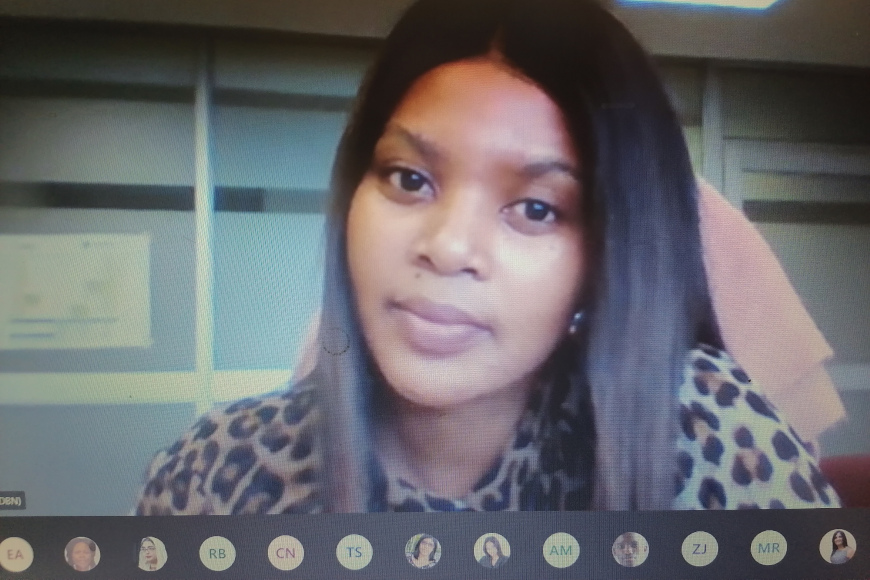The beginning of 2021 has been challenging for so many people as COVID-19 continues to claim more lives. To help the Durban University of Technology (DUT) staff to cope during this difficult time, the DUT Employee Wellness Program (EWP) hosted a webinar on Managing Your Grief and Loss During COVID-19, via Microsoft Teams last Thursday (21 January 2021).
Comforting the DUT staff members who are still grieving the loss of a few of their colleagues due to COVID-19, EWP’s manager, Samantha Rajcoomar said they hosted the webinar to give the staff an opportunity to bid farewell to their loved ones and friends.
“It also brings about post-traumatic stress as many of us feel we need to get that much needed closure. Recently the death of our colleagues has made it extremely difficult for us to concentrate or even to be emotionally present, not only in our work space but also in our own spaces. It has left us with great emotions, coming and going and it is actually not a good feeling. Remember in the era of social distancing, there is no right or wrong way to grieve. It has left us with feelings of anger, frustration, and paranoia,” said Rajcoomar.
She said the session will help them identify the emotional phase they are in and provide them with tools to help them to cope. She then introduced the guest speaker, Clinical and Counselling Psychologist, Nozibusiso “Nozi” Nyawose, who is also known for her work on the DStv programme named Utatakho.
Delivering her address, Nyawose said it is such an unprecedented time where people have to watch over and every time they leave the house, they pray that they return home safe, without contracting COVID-19.
“We live in a time where we are literally closing and shutting our doors, our colleagues can’t even come inside. We are scared, we literally can’t trust anyone. It is such a bad time in our lives. Now more than ever, its scarier because we are no longer seeing people dying on TV, it’s now closer. The circle is becoming thinner and thinner, we are losing friends, colleagues and family members. Even worse we can’t even attend their funerals because of all the regulations,” said Nyawose.
She said science is suggesting that most people will be able to bounce back and move forward after COVID-19 but feels the way this pandemic has affected the global nation she doubts that bouncing back and moving forward will be easy. Nyawose added that COVID-19 has disrupted people’s lives, jobs and the numbers of deaths and infections increases on a daily basis.
“It is very difficult to bounce back from such a pandemic. We are basically in a psychological crisis because this has also tested our ability to cope during challenging times. The difficulties in adapting now that we have COVID-19 losses is that Coronavirus is changing the way in which rituals of deaths for many religions are done. Families cannot see the bodies of their loved ones, in many instances. For many cultures, the washing of the body is a normal ritual and it is a form of closure. Relatives cannot touch, see or hold the body. Not all family members go to funerals because of the regulations due to social distancing, so adapting has been made very difficult,” said Nyawose.
Unpacking the five stages of grief, Nyawose said they are; denial, anger, bargaining, depression and acceptance. She, then spoke briefly on each stage, see below:
Denial
- A refusal to believe that the loss is real, especially for sudden and unexpected COVID-19 deaths.
- The brain protects itself from the difficult news.
- Denial is a primitive defence mechanism and is a way of protecting one from accepting the reality of what has happened.
Anger
- Anger may come at a time when we admit the loss.
- This emotion can be directed at any number of targets.
- May range from frustration to fury.
- Can involve drug and substance abuse as a coping strategy.
Bargaining
- We attempt to strike a deal with ourselves or a higher power to cope with pain.
- We ask ourselves “Why me?”
- Promise to be a “better person” as a channel for pain and for the return of the loved one.
- Guilt is also common during this phase as we dwell on past events searching for things we could have done differently.
Depression
- Natural response for people experiencing loss.
- Realisation that our lives have forever changed.
- It is not a sign of mental illness but can lead to mental illness if persistent
Acceptance
- Is a slow process and may take time.
- Varies from individual to individual.
- Does not mean grief is over
- It is an understanding and acceptance that loss has happened and cannot be changed.
Lastly, Nyawose urged the attendees to allow themselves to go through the grieving stages and be able to know when to seek assistance.
Pictured: Nozibusiso Nyawose
Simangele Zuma


